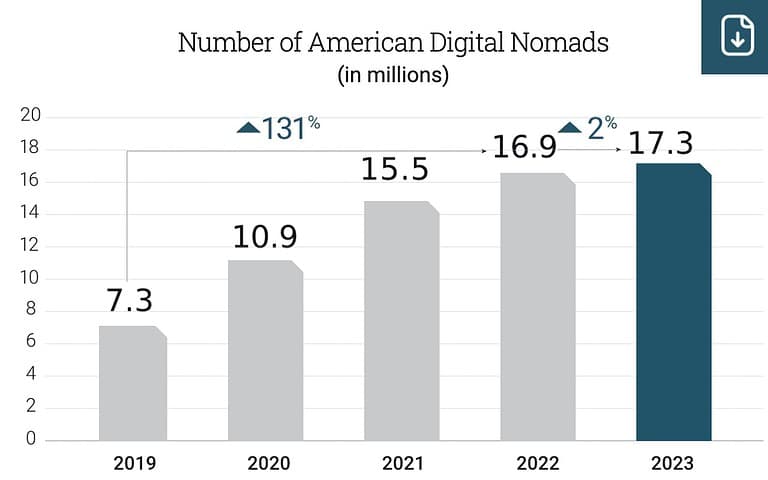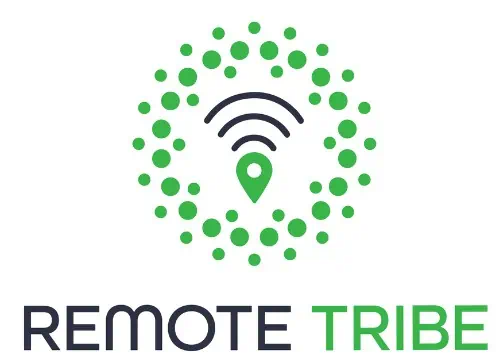Remote work has been around for a while. Yet, it wasn’t until the pandemic that working from home became run-of-the-mill and introduced significant changes to the office. Even after the restrictions related to the health crisis have eased up, people continue to have flexible work arrangements.
Learn more about the demographic, lifestyle and top reasons digital nomads choose to escape the four walls of an office and work while traveling.
Demographic Profile of Digital Nomads
Who are the digital nomads? Find out the profile and characteristics of people who work remotely.

This figure reflects an astonishing 131% increase from 2019 before the pandemic hit the world. Telework quickly entered the mainstream — now, 11% of U.S. workers categorize themselves as digital nomads.
It’s not a surprise that men outnumber women in this regard. Women are often tied to more responsibilities, consuming their time on child care, elder care, and running the household. They face more challenges in squeezing work into their daily schedule.
Men continue to comprise a larger share of digital nomads than women. In 2023, 56% of the digital nomads surveyed reported they were men, with 43% reporting female and 1% nonbinary.
MBO Partners Tweet

3. The Average Age of Digital Nomads Is 34 Years Old
A substantial number of digital nomads are millennials between the ages of 27 and 42. They are fueling the trend of prioritizing experiences over material things. Many pursue a career as digital nomads because it provides the most flexibility in work and competitive pay that allows them to live the lifestyle they desire.
Credits for the data go to: Nomadlist.com
Of this number, 54% have a bachelor’s degree, 33% have a master’s and 3% have a doctorate. Only 10% are high school graduates. One plausible reason young university graduates opt to work remotely instead of getting an office job is the appealing lifestyle where they can combine travel with work.
Source: Statista.com
Digital nomads also get paid more compared to office-based employees.
Credits for the data go to: Payscale.com
Digital Nomad Lifestyle
The best advantage of flexible work is the opportunity to explore and travel the world. People are attracted to this lifestyle because it’s a break away from the “normal life” where you only switch environments between work and home. Here are some facts about the kind of lifestyle digital nomads have.
While you might think most people would want to travel abroad once they got a remote job, statistics revealed more than half of American remote workers prefer to visit locations within the U.S. borders. Meanwhile, 47% expressed their goal to spend some time in another country, and 10% wanted to spend an entire year abroad.

Some digital nomads don’t work full-time and only take on jobs on a project basis. Depending on the task load, these people may work 40 hours or less in a week. Some one-third work over that, such as those with side hustles on top of full-time jobs and solopreneurs handling multiple clients.
Japan is becoming the fastest-growing destination for individuals who want to work while traveling. Not only is it the home to 29 out of the Fortune 500 companies, but it also has a lot to offer in terms of its deep culture and beautiful landscapes.
What’s more, it’s 47.9% more affordable than New York, making it a good temporary base for digital nomads. Other locations on the list are Da Nang, Vietnam, Seoul, South Korea; and Kuala Lumpur, Malaysia.
Over half of people with flexible jobs are part of an organization. Roughly 43% work as freelancers or independent consultants, and 4% are business owners employing at least one person.
Despite the rave about the nomadic lifestyle, many still choose to have a stable job, receive company benefits, and have fixed weekly working hours by getting employed. Even with employee status, it still allows for the freedom and flexibility to work from anywhere.
Every digital nomad leads a different travel lifestyle. Others prefer to do it slowly, as they want to immerse themselves in the local culture and stay in one location for months. These types of people plan and know their destination before moving, such as what attire is considered improper, and learn a couple of local phrases for conversations.
Meanwhile, younger nomads have more energy to hop between cities or countries and move constantly. It all depends on each person’s choice. Others who find a place they’re comfortable with may choose to stay there for years.
Advantages of a Nomadic Lifestyle
People take advantage of a remote work setup for countless reasons. Here are factors motivating digital nomads to choose telework over a conventional office job.
An excellent benefit of working from anywhere is the option to decide where to live. For people who want to travel, experience other cultures and settle in a place with a warm climate and lower cost of living, a nomadic lifestyle is the perfect recommendation. If these perks appeal to you, consider getting a remote job.
People are attracted to working remotely as they can decide when and where to work, which a traditional workplace doesn’t allow. In an office-based job, everyone must be at their desk at 9 a.m. and leave at 5 p.m. While it’s systematic, employees lack control or have little say over their schedule, making it a disadvantage. Around 26% of American salaried workers say they do work outside of their working hours, with a majority claiming they have no work-life balance. It’s no surprise that more and more people are choosing more flexible work options.
In recent years, mental health has become a crucial factor for candidates in applying for and accepting a job offer. With many people reporting work as a significant stressor, often leading to burnout, many turn to online work as it gives them the environment and opportunity to support their mental health more effectively. With this setup, it’s easier and more convenient to request personal time off to care for your mental health compared to if you work in the office.
Those who work from home are more productive and satisfied with their jobs — both are employee engagement features. In addition, having control over their work schedule is a good motivator for digital nomads to stay optimistic about their careers.
Employee happiness is directly associated with productivity. If you do tasks efficiently and effectively, your organization can achieve its goals and sustain its growth. That’s why many HR leaders center their workplace programs on making their employees happy, as it affects the bottom line. Offering remote work is a strategy they see that drives increased productivity.
Future of Digital Nomadism

Is remote work here to stay or will workplaces return to a pre-pandemic office-based dynamic? Find out the future of remote work and whether being a digital nomad will give you stability in terms of work opportunities.
The remote work market continues to balloon rapidly, and experts project millions more will join the industry in the next few years. Many countries welcome digital nomads on their lands to energize their economies through visa programs. For instance, Spain recently offered international teleworkers a residency visa valid for a year. It’s an advantage to those who want to experience living in Madrid or Barcelona.
Similarly, Canada has allowed a longer visitor visa of up to six months for digital nomads. Uruguay also opened up residence permits lasting six months to a year. Remote work has made it easier and more possible for people to travel and experience life outside their country of birth.
With countries welcoming digital nomads, plus the attractive benefits of remote work, businesses moving their operations online and organizations wanting happy employees, there will likely be a billion digital nomads a decade from now.
The gig economy — actively participated by freelancers, independent contractors, project-based workers and part-time hires — will see an annual growth rate of 16.18%, driving a massive demand to the industry. This forecast confirmed remote work will likely become standard.
The Digital Nomad Trend Continues
Looking at these statistics, the digital nomad trend will undeniably continue to rise. Driven by factors such as the change in consumer shopping habits to online, businesses wanting to build digital presence to reach more audience and HR leaders aiming to do everything at all costs to increase employee happiness — the nomadic lifestyle will change how people make a living.








